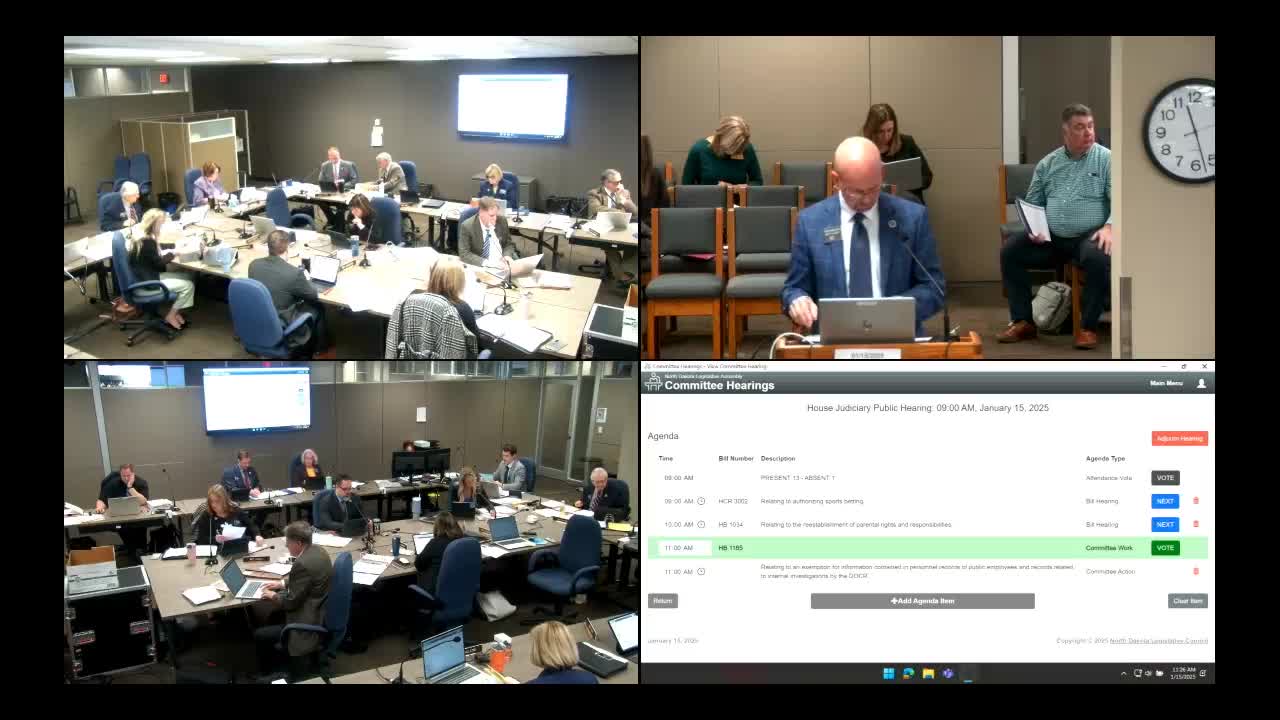Cities, League of Cities and sheriffs differ over proposed narrower public‑records exemptions for personnel investigations
Get AI-powered insights, summaries, and transcripts
Subscribe
Summary
House Bill 1185 would amend public‑records law to exempt certain personnel performance and discipline records (unless part of an internal investigation) and to extend the temporary exemption for internal investigative records from 75 to 180 days.
The House Judiciary Committee heard testimony on House Bill 1185, a proposal to narrow public disclosure of certain employee personnel records and to extend a temporary exemption period for internal investigative records.
Representative Scott Louser introduced the bill and said the change would allow local governments to implement merit‑based pay systems without triggering widespread public access to personnel coaching, disciplinary records and performance evaluations. "What we're asking for in this bill is we're asking for a sliver," Mike Blessum, a Minot city alderman who testified in support, said. Blessum described local budget work that prompted the city to explore performance‑based pay and said open personnel records make it difficult to document candid performance reviews.
The League of Cities offered a proposed amendment that would exempt "employee performance and discipline records, unless part of an internal investigation," and would extend the current 75‑day exemption on internal investigation records to 180 days to give employers time to complete investigations and prepare reports. Stephanie Ingebretsen, deputy director and staff attorney for the North Dakota League of Cities, said the amendment narrows the prior drafting errors and advises the committee on statutory language.
Minot City Manager Harold Stewart said recent local investigations illustrated the administrative burden and potential chilling effect of immediate public access to draft investigative notes. Stewart described a police‑department investigation that required outside investigators and interviews of more than 40 employees; he said the 75‑day window began when the city first learned of issues and left little time to complete work before records could become public. "When we started this investigation... that's when the clock started. It's not until mid‑September that I was able to identify an investigator that was qualified," Stewart said, arguing a longer exemption period would preserve investigative integrity and encourage employee participation.
Opponents included the North Dakota Association of Counties, which raised concerns from sheriffs that broad exemptions could impede pre‑employment background checks for law enforcement hires. Danelle Presky, executive director for the Sheriffs and Deputies Association, said the association opposed the bill as drafted and asked that law‑enforcement background records remain available to agencies conducting employment checks. The association interpreted the League amendment as exempting personnel performance and discipline records from disclosure absent an investigation and warned that would limit sheriff offices' ability to vet applicants.
Committee members asked about the amendment’s drafting, whether attorney notes should remain exempt, and whether the change should include an emergency clause. Witnesses and municipal officials said councils retain discretion to release records voluntarily and that an exemption does not prevent a governing body from making records public. The committee closed the hearing; no committee vote was recorded in the transcript.
